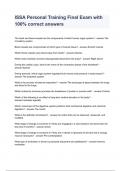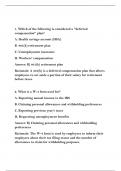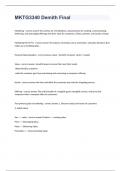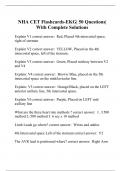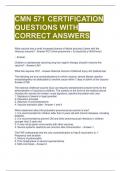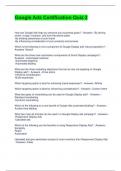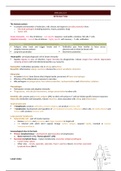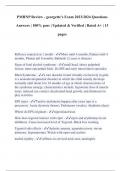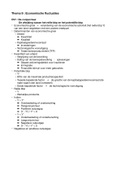COGNITIVE NEUROBIOLOGY
5052CONE6Y
9 JANUARI 2023
FEMKE TE DORSTHORST
,Introduction and assignments
Dr. Suziki – 9/1/2023
Central questions:
- How does the brain mediate cognitive processes?
- How can we measure and quantify the relationship?
- How can we utilize this knowledge to help people with brain disorders and cognitive
impairments?
HC 2: Neurobiological techniques
Dr. M. Suzuki
A technique is neurocognitive when:
- It simultaneously measures the brain
activity & cognitive function
- To express what we are thinking
Modern neurocognitive tools:
- fMRI
- Extracellular recordings
- Optogenetics
- DREADDs (Designer Receptor Exclusively Activated by Designer Drugs)
MRI & fMRI
MRI = Magnetic Resonance Imaging
fMRI = functional Magnetic Resonance imaging
Principle
Works on the basis of electrical induction.
Electrical induction = A moving magnetic field induces an electric field (and
vise versa) which causes measurable electric current to flow in e.g., a wire.
It has a huge magnetic coil → that produces a constant magnetic field (B0)
MRI scanner contains various magnets and coils for measuring and manipulating the electric and
magnetic field.
- It detects miniscule fluctuations in electric field.
What is measured in the brain?
- Hydrogen (waterstof) is the most abundant in your body, it’s
part of water, fat, protein, bone and brain.
- The nucleus of hydrogen atom (H) is a single, positively
charged proton. A proton (H+) is tiny, spinning magnet.
- The direction of the field of each proton is arbitrary; thus,
the net field of all protons is 0.
1
, - Unless there is an external magnetic field (B0). Then the magnetic field of the protons (M0)
will follow the direction of the external magnetic field and net will be >0.
- By introducing a second magnetic field (B1), all protons can be tilted 90 degrees in a fraction
of one second.
- After B1 is switched off, M0 turns around (because of the proton’s spin) → this generates a
current → which is measured in the receiver coil.
M0: magnetic field of proton.
B0: fixed magnetic field
B1: tilting magnetic field (switched
on and off)
- When B1 is turned off M0, returns to follow the fixed field of B0 again, causing the signal to
go back to 0.
- How fast M0 returns to the original (and how fast the signal decreases to 0) depends on the
molecule (and thus on the tissue type).
- The relative amount of signal per ‘voxel’ is the contrast you see on the MRI scans.
o Voxel = a pixel, measures the signal in each point. And put all together
Many different contrasts are possible by combination and sequences of different fields.
Functional MRI (fMRI)
Functional MRI is made possible by the fact that M0 recovers more slowly in oxygenated blood
than in deoxygenated blood.
BOLD = Blood Oxygen Level Dependent
Baseline Active
Oxyhemoglobi
Deoxyhemoglobin
Hemodynamic response
Model progression of BOLD contrast in a voxel with transient, neural activity.
(Hb = Oxyhemoglobin, dHb = deoxyhemoglobin)
By correlating the measured signal with
this model response, it is possible to
determine when and how strongly the
tissue was activated.
2
, How do we solve the question: is this brain region activated by the stimulus?
- You want to compare the baseline to when the stimulus is presend and when there is no
stimulus → But there is a lot of noise.
- So you want to correct (average out) for the noise by doing a lot of measurements
Blocked design vs Event related design
Blocked design:
- Stimuli are often presented in quick succession in blocks
between baseline periods.
- Signal increases to plateau
o Multiple trials neded for good SNR (signal to noise ratio)
o No information about duration or time course of
activation
o Only possible for simple tasks (yes or no stimulus)
Event related design
- Between stimuli the signal goes back to the baseline.
- Information about duration and time course of activation is available.
- Complex tasks are possible
- But: SNR can be worse because:
o Net smaller signals
o Less trials in the same time/ the same budget
o More complex tasks have more conditions, fewer trials per condition
Result analyse
The blobs you see in the results of the research articles are → the BOLD signal, they indicate spots
with statistical differences between conditions.
- BOLD is not an absolute measure of activity; it measures relative activity (to baseline)
Pros & Cons
Advantages
1. You can measure a whole, active human brain
2. It can be combined with many kinds of cognitive task
3. Versatile
o Anatomy
o Connectivity (DTI)
o Metabolites (fMRS)
o Neural activity (BOLD)
3
5052CONE6Y
9 JANUARI 2023
FEMKE TE DORSTHORST
,Introduction and assignments
Dr. Suziki – 9/1/2023
Central questions:
- How does the brain mediate cognitive processes?
- How can we measure and quantify the relationship?
- How can we utilize this knowledge to help people with brain disorders and cognitive
impairments?
HC 2: Neurobiological techniques
Dr. M. Suzuki
A technique is neurocognitive when:
- It simultaneously measures the brain
activity & cognitive function
- To express what we are thinking
Modern neurocognitive tools:
- fMRI
- Extracellular recordings
- Optogenetics
- DREADDs (Designer Receptor Exclusively Activated by Designer Drugs)
MRI & fMRI
MRI = Magnetic Resonance Imaging
fMRI = functional Magnetic Resonance imaging
Principle
Works on the basis of electrical induction.
Electrical induction = A moving magnetic field induces an electric field (and
vise versa) which causes measurable electric current to flow in e.g., a wire.
It has a huge magnetic coil → that produces a constant magnetic field (B0)
MRI scanner contains various magnets and coils for measuring and manipulating the electric and
magnetic field.
- It detects miniscule fluctuations in electric field.
What is measured in the brain?
- Hydrogen (waterstof) is the most abundant in your body, it’s
part of water, fat, protein, bone and brain.
- The nucleus of hydrogen atom (H) is a single, positively
charged proton. A proton (H+) is tiny, spinning magnet.
- The direction of the field of each proton is arbitrary; thus,
the net field of all protons is 0.
1
, - Unless there is an external magnetic field (B0). Then the magnetic field of the protons (M0)
will follow the direction of the external magnetic field and net will be >0.
- By introducing a second magnetic field (B1), all protons can be tilted 90 degrees in a fraction
of one second.
- After B1 is switched off, M0 turns around (because of the proton’s spin) → this generates a
current → which is measured in the receiver coil.
M0: magnetic field of proton.
B0: fixed magnetic field
B1: tilting magnetic field (switched
on and off)
- When B1 is turned off M0, returns to follow the fixed field of B0 again, causing the signal to
go back to 0.
- How fast M0 returns to the original (and how fast the signal decreases to 0) depends on the
molecule (and thus on the tissue type).
- The relative amount of signal per ‘voxel’ is the contrast you see on the MRI scans.
o Voxel = a pixel, measures the signal in each point. And put all together
Many different contrasts are possible by combination and sequences of different fields.
Functional MRI (fMRI)
Functional MRI is made possible by the fact that M0 recovers more slowly in oxygenated blood
than in deoxygenated blood.
BOLD = Blood Oxygen Level Dependent
Baseline Active
Oxyhemoglobi
Deoxyhemoglobin
Hemodynamic response
Model progression of BOLD contrast in a voxel with transient, neural activity.
(Hb = Oxyhemoglobin, dHb = deoxyhemoglobin)
By correlating the measured signal with
this model response, it is possible to
determine when and how strongly the
tissue was activated.
2
, How do we solve the question: is this brain region activated by the stimulus?
- You want to compare the baseline to when the stimulus is presend and when there is no
stimulus → But there is a lot of noise.
- So you want to correct (average out) for the noise by doing a lot of measurements
Blocked design vs Event related design
Blocked design:
- Stimuli are often presented in quick succession in blocks
between baseline periods.
- Signal increases to plateau
o Multiple trials neded for good SNR (signal to noise ratio)
o No information about duration or time course of
activation
o Only possible for simple tasks (yes or no stimulus)
Event related design
- Between stimuli the signal goes back to the baseline.
- Information about duration and time course of activation is available.
- Complex tasks are possible
- But: SNR can be worse because:
o Net smaller signals
o Less trials in the same time/ the same budget
o More complex tasks have more conditions, fewer trials per condition
Result analyse
The blobs you see in the results of the research articles are → the BOLD signal, they indicate spots
with statistical differences between conditions.
- BOLD is not an absolute measure of activity; it measures relative activity (to baseline)
Pros & Cons
Advantages
1. You can measure a whole, active human brain
2. It can be combined with many kinds of cognitive task
3. Versatile
o Anatomy
o Connectivity (DTI)
o Metabolites (fMRS)
o Neural activity (BOLD)
3


